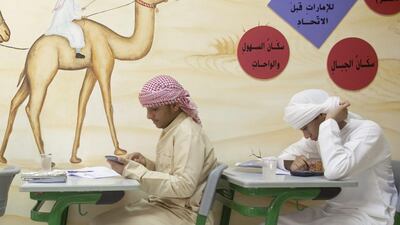When I was in ninth grade, the mandatory curriculum included a year of United States history. My history book – which contrary to what my children say, was not written on stone tablets – included two very short chapters at the end, one on “contributions of women”, and the other on “contributions of African-Americans”. Other than those specific chapters, the book was a long chronology of war, conquest and presidents, and as I look back at the book now, it seems like a demonstration of the old saying that history is written by the victors. I’ve been thinking about that book recently because my older son is about to start his GCSE exams, the tests that mark the end of Year II; and because for the past few weeks seniors at New York University Abu Dhabi have been presenting their final projects. The GCSEs are quite different from the independent projects undertaken by the university students, of course, and yet both the exams and the projects endeavour to measure what a student has learnt and how well the student can demonstrate that learning.
My old history book offered a very clear picture of what we were supposed to learn, both explicitly and implicitly. It created a narrative of US history that reinforced ideas of US exceptionalism and skated over the inconvenient bits (the Civil War, the treatment of Native Americans). Those two ancillary chapters implied that while non-white non-men may contribute to history, they didn’t make the actual history itself.
Now, however, we think of “history” as the product of many different factors and populations, a more complex view that gives us a fuller understanding of how we’ve got to where we are. Of course this more complex view also makes it harder to study and to test: you can’t include everything in a history curriculum, for instance, so how do you choose where to set the focus?
I can hear the teachers in the STEM areas of science, technology, engineering, and maths saying that their disciplines are more clear-cut: the elements in the periodic table don’t protest about being marginalised, for example, and the planets whirl along in their orbits regardless of human politics. The planets might not be influenced by human politics, but as any young woman interested in STEM can tell you, it’s a bit more complicated on the ground, where women are consistently underrepresented in these fields. It’s almost as if they’re still working inside the “contributions of …” chapter and haven’t yet made it into the rest of the book. (The one exception to this trend is in the Arab world, where women are making consistent inroads into these disciplines.)
The NYUAD student projects across the disciplines seemed intent on challenging the conventional narratives, which is the difference between university-level work and the exams such as the GCSE. What struck me about these projects is that they demonstrated what the students had learnt not through a point-by-point regurgitation of disciplinary principles or facts but through their ability to transform the building blocks of instruction into something new. The students developed these projects, in many instances, in conjunction with what gets called “experiential learning”, a fancy phrase that means doing things outside the classroom: visit an archaeological dig to understand ancient art, participate in international debate competitions about the intricacies of global economies, visit a hospital to see the innovations in medical imaging.
That’s what we want from our university graduates, isn’t it? Young people who can take information and adapt it? We want students who, if confronted by my ancient history book, would look at those last-chapter contributions and wonder if anything else had been left out. The question we need to ask ourselves, then, is how can we cultivate that spirit of inquiry in younger students so that they learn how to ask the hard questions that can lead to innovation and creativity, and who won’t be content with just the words in a textbook?
Deborah Lindsay Williams is a professor of literature at NYU Abu Dhabi

